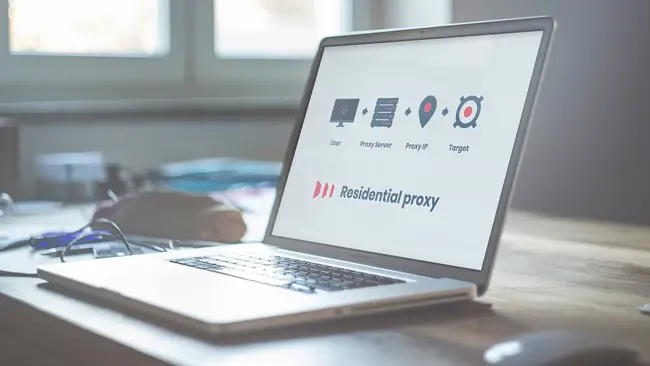Protecting our identity online has become a necessity instead of being a luxurious option. It is not a great idea to expose your actual IP address to the many websites you visit and the services you use. Some of these services may even go to the extent of blocking your IP if you go beyond the so-called FUP (Fair Usage Policy.)
While VPNs and custom DNS services may seem good options, they are not suitable for all instances. If you want to protect your identity while doing SEO content compliance or competitor analysis, you still need a dedicated IP. Unfortunately, VPNs cannot provide these. Fortunately, it is precisely where residential proxies become the optimal choice.
In this guide, we have talked about everything you want to know about residential proxies, how they work, and why you should use them. We will start with the basics, exploring what residential proxies are in the first place.
What Are Residential Proxies?
Residential proxies are private internet proxies made for location-sensitive purposes. These proxies will help users connect to websites and other internet services without revealing their actual IP address. You can use these proxies as residential IPs — as though you have an internet-connected device in the location you have chosen.
For example, let’s say that you are from the United States. You want to access a service that works best for those who are from Europe. In this case, you can buy a residential proxy in Europe. This proxy will route your entire internet traffic through the intermediary server, making the website/service perceive that the request originates from Europe, not the United States.
We shall see why this method is different from a VPN.
Residential proxies follow a different approach to protect your identity online. Instead of simply concealing your IP address, residential proxies allow you to make server requests through another IP address. While a VPN does half of this job, it is virtual for the most part. However, when it comes to residential proxies, the IP address you get belongs to an actual device connected to the internet. Therefore, a website/service will find that traffic comes from an actual device connected to the internet.
Why Should You Use Residential Proxies?
Are you still wondering why you have to use residential proxies? Well, we have to make a few things clear.
You do not need a residential proxy if you want to stream Netflix or access geo-blocked content. A VPN or a DNS service will do the job. Here is the problem, though. When you engage in tasks like web scraping, SEO analysis, and competitor analysis, IP addresses provided by a VPN will get blocked. Mind you, a VPN service will give the same IP address to multiple users at different times. Long story short, you cannot send more than a few web requests using a VPN. It is where residential proxies are essentially different.
Because you get a real-world user IP assigned to you, residential proxies make working with the following instances possible.
Web Scraping
Web scraping is an effective way to access competitor data in bulk. It plays an important part in day-to-day marketing needs. With the help of residential proxies, you can do mass web scraping without any problems. Because there is an option to change IP addresses per session, you will not get flagged, either.
Local SEO
If you are working with local SEO, you need analytics from a specific vantage point. By choosing a residential proxy from the desired location, you can get the best out of local SEO tools and data analysis. Once again, it means you can stay away from blocks.
SEO Compliance
In digital marketing, you have to ensure that your content is optimized for SEO from different points. To do it, you can use tools like Xrumer and Scrapebox. With advanced compatibility, you can stop worrying about potential limitations.
Social Media Bots
You cannot use social media bots and scripts with VPNs or general IP addresses. However, if you have got a residential proxy at your disposal, it becomes an easy task. You can make an unlimited number of requests without getting flagged.
Other Uses
In addition to these, residential proxies can offer you unrestricted access to geo-locked content. You simply have to buy a residential proxy from the desired location. Some proxy providers can also offer an advanced level of integration and customization. For instance, you can specify not only the country but also the city and state where you want the IP address from. This feature comes in handy when you are working with SEO and marketing.
In short, residential proxies are great from a business standpoint.
How to Use Residential Proxies?
Getting started with residential proxies is easier than you may have expected. Of course, it depends on the platform from where you buy residential proxies in the first place. In most cases, you can use a browser extension or a desktop app to integrate your device with the residential proxy service. After that, the software will choose a suitable IP address based on the situation.
You can also use third-party solutions for proxy management. If you want to handle multiple types of proxies for different needs, one of these platforms will be the best option. At the end of the day, you do not have to worry about compliance. The best way to use a residential proxy is to follow the steps recommended by the service provider.
Frequently Asked Questions
Now that you know the basics about residential proxies, shall we answer some common queries?
Yes, you can buy residential proxies from a trusted provider. Residential proxy service providers may offer packages with one or more residential proxy addresses. They may also have restrictions over bandwidth and locations.
Unlike VPNs, residential proxies are not virtual. Instead, the IP addresses provided by residential proxies are connected to actual devices connected to the internet. Therefore, having a range of residential proxies can be expensive.
If you have a compatible device, you can use residential proxies anywhere. You must be able to integrate the residential proxy service into the device you are using. You may need additional customization options if you want to use SEO and data analytics tools, though.
Yes, residential proxies are legal. It means you can use these proxies for web scraping and data access with ease. In addition, residential proxy services follow measures to prevent flagging and blocking by changing the IP address ranges.
Rotating proxies are residential proxies that change the IP address per session or at regular intervals for security reasons. In most cases, it is done to ensure that the IP address does not get banned/blocked due to a high inflow of requests.
The Bottom Line
As you can see, getting a residential proxy could be one of the best decisions for your business needs. Even if you do not want access to web scraping or data analytics, residential proxy services can help you unlock a variety of geo-blocked content. Furthermore, considering that you can explore the web as a regular user — not a VPN IP address —, the pricing plans also seem reasonable.




Leave a comment
Have something to say about this article? Add your comment and start the discussion.